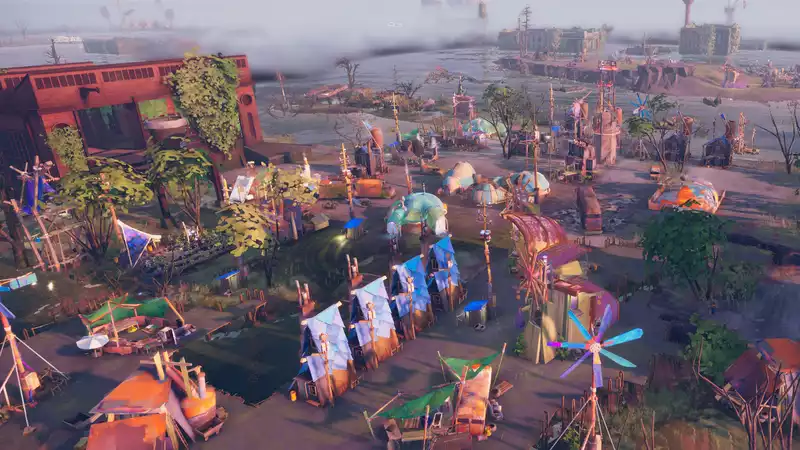Floodland is, in many ways, an epilogue to the traditional city builder. As a result of climate change, civilization has been reduced to ruins and you must now rebuild with the flotsam we have left behind. There are no lush, unspoiled grasslands to stick highways on, as in "Cities Skylines". There are plenty of crushed cars, collapsed houses, decaying ships and quirky skyscrapers. For better or worse, all of this will be looted to rebuild society.
Even before the first structures are erected, settlers must be sent into the fog of war to scout the area for resources and buildings that look promising. The most pressing resource is garbage, which should be raked up to build primitive houses and set up occupation stations to put the citizens to work.
The world may be a waterlogged apocalypse of islands dotted with nameless cities, but at the start, the resources are almost overwhelming. Build sorting sheds to collect garbage, fishing ports and open-air cookhouses to supply the camp with risk-free food, and water purifiers to carry clean drinking water. There is no radiation to worry about in this refreshingly hopeful tone of the game - the world may be ending, but if we manage to work together, we'll be fine.
The first brick wall is the number of survivors, which you'll hit almost immediately. Trees have to be cut, trash has to be collected, and supplies have to be transported from place to place. In most city builders, the population grows naturally over time, but here, settlers are sent to scour the city to investigate abandoned buildings.
Each straggler gang that joins your settlement brings blessed relief. Whew, now you have 10 more pairs of hands to work in the insect hut, a bakery station, and a laboratory to generate research points. Unfortunately, these bountiful resources will not last forever. [Even if you pick through the herb fields and catch all the fish from the shoreline, some will eventually respawn, others will not. We should have been better prepared, studying flour mills and bakeries, improving our storehouses and storing more resources, but at some point we will have to expand beyond the confines of the starting island.
Expeditions to other islands waste time and resources, but can yield piles of unadopted items and sometimes new clans of survivors. Unlike the usual stragglers, these clans are numerous and have a strong, established political identity; the central message of Floodland may be unity, but that does not make it easy to carry out. Starting the game with one clan, it is fairly easy to get along on their own, but as more clans are grafted into the settlements, tensions rise. The Good Neighbors are individualists, while the Survivors of Oak Hill worship the hierarchy of the previous world. Each is represented by a talking head, who appears frequently to let the clans know they are not getting along.
Anna Brown of Oak Hill Survivors is in favor of public executions, and Lily Kapoor of Good Neighbors finds the idea frightening. When you choose one side or the other and pass a law allowing the construction of a jail, the Unrest Meter of the opposing clans grows a little louder. High unrest leads to crime, but if the squabbling becomes too serious, you can always move the clan to a new district or another island. This has the advantage of smoothing relations between clans, but it also means spreading society thin. Smaller, closer-knit infrastructures may be easier to manage in the long run.
Despite the overall hopeful tone, Floodland pulls no punches when it comes to survival mechanics. Rebuilding a society is hard work, but it ultimately felt grueling as they had to deal with the glacial pace of technological acquisition while juggling fish supplies, wood shortages, and the bickering of multiple clans.
You start with essentially no idea how to stick two planks together to make a path or throw a fishing line into the water. Unless you replenish it with one of two types of currency that can only be earned through exploration, you will accumulate only a small percentage of research points. Nevertheless, as mentioned above, exploration is a long game. As with any city builder, your finger will be on the fast-forward button while you wait for things to happen. Unfortunately, you may want to put your finger back on it.
As the settlements became larger and more complex, performance began to suffer. We became accustomed to occasional choppiness, especially when many work elements were on the screen at the same time, but the frame rate plummeted when fast-forward mode was activated. The fast-forwarding issue remained, but hotfixes were applied for performance. In the end, it could only be used for short periods of time and nothing else could be done until it was switched off.
But even when it is working on its own I find it hard to connect with Floodland. It's a game that is very much about people, yet all you really see are static portraits of a few clan leaders, and the actual settlers are unidentifiable ants that carry things. Fitting dozens of people into the persona of a single clan leader is a reasonable idea on this scale, but it makes the game a game of squabbling politicians rather than of dwarfs who do all the work.
Floodland is a game that encompasses (and exhausts) survival, expansion, and politics. Its exploration element is compelling and satisfying as you continue to solve all the logistical problems that pile up. Sadly, there was no reason to care about this game, which is a brainchild that is hard to hate.
.

Comments